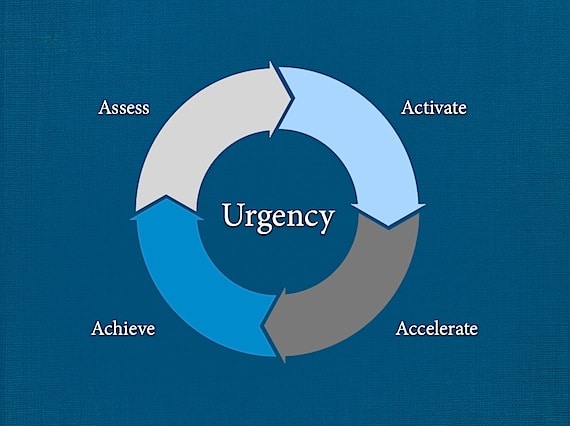Twenty years ago, Robert Wolgemuth and I started a publishing company. We had a dream to publish books that truly made a difference, in people’s lives and in the overall culture.
The only problem was that we didn’t have much money. Our competitors had seemingly every advantage, including piles of working capital (or so we thought). All we had was a dream and our ability to respond quickly.
As it turned out, we signed numerous authors for less than the competition was willing to pay, simply because we moved fast and got the deals done. Many authors were willing to give up some advance money, believing that our hustle in signing them would translate into similar hustle in selling their books. More often than not, they were right.
Thus, responsiveness became our competitive advantage. We could never pay more than our competition and usually offered much less. But we could out-maneuver and out-flank almost all of them. We were lean and mean. As a result, we grew rapidly.
Unfortunately, in the 20-plus years since we began that venture, I have learned that there seems to be an inverse relationship between a company’s size and the sense of urgency embedded in the culture.
More often than not, small companies have a sense of urgency. Why? Because their very survival is at stake. If they don’t move quickly, they get squashed by larger, more established competitors.
On the other hand, it is rare to find large companies that truly have a sense of urgency. Their circumstances rarely demand it. They can continue with business-as-usual and do pretty well. Nothing has to be done today or even this week. Nothing is really at stake—or so they think. Often, by the time they wake up, it’s too late.
But in today’s environment, no one can afford to drift along with the status quo. Growth is not a foregone conclusion. Even survival cannot be taken for granted.
The companies that thrive in today’s economy will be those that can shift their cultures from the slower pace of business-as-usual to urgency. Because of this, I have made “Urgency” our annual theme for Thomas Nelson. I want this attribute to permeate every aspect of our culture. I know we have a long way to go.
But first, we have to understand it. To create a sense of urgency, we must do four things well:

- Activate. Like many larger organizations, we do lots of analysis. Obviously, this can be helpful. No one wants to go into battle without a carefully thought-through battle plan. But as everyone knows, analysis can easily lead to “analysis for analysis sake.” When this happens, the organization becomes paralyzed.Often the real issue is courage. The point of absolute certainty never comes. It is foolish to assume that it does. Instead, urgency requires that we activate quickly: Make a decision. Get off the dime. Do something!
As the old adage goes, “it is easier to steer a moving object.” If you’ve made the wrong decision, you can adjust. But if you wait too long, you miss the opportunity entirely.
More than ever, people want fast decisions. Speed can be a competitive advantage. But this requires leaders who are willing to activate and get themselves, their teams, and their projects into motion.
- Accelerate. Urgency requires more than activation. Yes, you have to start quickly, but you also have to keep things moving. Getting a project green-lighted is only the beginning.There are hundreds of impersonal forces (and some personal) that will conspire to slow you down—paperwork, approvals, processes, committees, budgets, etc. Some of these things are necessary—but not as many as you think or the organization would like you to believe.
It is the nature of bureaucracies to become self-serving. When they do, the process becomes an end in itself. As a leader, you have to fight this. You have to identify obstacles and remove them. You must keep the pedal to the metal and keep things moving. If you don’t, inertia will take over and your project will die.
- Achieve. Cultivating a sense of urgency is all about producing results. All the stuff that it takes to produce results—paperwork, approvals, processes, committees, and budgets—are not an end in themselves. They are only the means. If you do all this and don’t accomplish your goals, you have lost.Too often people think that the objective is to complete their task list. If they do so, they think they have actually accomplished something. This is not necessarily the case. Tasks are a necessary but insufficient condition of achievement.
My goal at Thomas Nelson is to create a culture that is outcome-focused rather than task-focused. I don’t care how we produce the results (within the appropriate ethical boundaries), so long as we produce them. We need to stay focused on the what and give our people room to decide the how.
- Assess. Urgency does not rule out assessment. In fact, it demands it. If we are going to get faster at producing results, we have to assess what is working and what is not. We must then eliminate the waste.Everything should be questioned in light of whether or not it impedes or facilitates the outcome. Does a meeting enable us to move more quickly? If so, great. Call a meeting. But so often we call meetings as a way to procrastinate the decision. Then a single meeting begets more meetings. Before you know it, you’ve built a slow, lumbering bureaucracy.
The only antidote is to this is to eliminate everything that does not facilitate the desired outcome. Our job as leaders—as opposed to bureaucrats—is to remove the obstacles and give our people the best chance of achieving their goals and ours.
What specifically can you do to create more urgency? Try these:
- Walk faster—show some hustle.
- Respond faster to emails and voice mails. Don’t allow yourself to become someone else’s excuse for not getting their work done.
- Get to the point quickly and insist that others do the same.
- Keep meetings short and on-point. Always insist on an agenda.
- Eliminate every piece of paperwork that doesn’t facilitate a specific outcome. My motto: “When in doubt, throw it out.”
- Be quick to change tactics. If something is not moving you toward your desired outcome, do something else.
- Do it now!
It’s easy to see a lack of urgency in others, but can you see it in yourself? What else can you do, beginning now, to create a sense of urgency in yourself, your department, and with your projects?
Last modified on June 14th, 2022 at 10:10 am
Disclosure of Material Connection: Some of the links in the post above are “affiliate links.” This means if you click on the link and purchase the item, we will receive an affiliate commission. Regardless, we only recommend products or services we use and believe will add value to our readers. We are disclosing this in accordance with the Federal Trade Commission’s 16 CFR, Part 255: “Guides Concerning the Use of Endorsements and Testimonials in Advertising.









